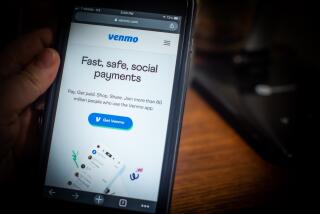Cash-Only Consumers Pay a Price for Not Using Credit
- Share via
Rogelia Nungaray, a 43-year-old north San Fernando Valley resident who immigrated from Mexico more than two decades ago, has never done business in cyberspace.
With no credit cards, no checking account and not a centavo of cybercash, Nungaray and her husband of 27 years, Vicente, pay for everything with cash. That means using green for groceries, utility bills, even insurance for the 1989 Mercury sedan they bought last April from a Van Nuys used car dealer.
“We always pay in cash,” said Nungaray, taking a break from her housekeeping duties at the hillside home of an employer. “‘It was more easy for us.”
But a few months ago, the brakes on the car failed, triggering a crash. When the Nungarays went to file a claim with their insurance broker, she said, they discovered that they apparently had no policy.
The Nungarays have retained a lawyer, who is trying to interest prosecutors in the case.
“I very strongly suspect that the fact that they paid in cash made them much more easily victimized,” said James Carr, their attorney. “There’s not the same [kind] of track record.”
The insurance broker denies any wrongdoing. Yet, regardless of whether fraud was involved, it’s hard to argue with Carr’s assertion that people like the Nungarays are easier targets for fraud.
They have no canceled checks, no charge card payments, no electronic records of any kind to back them up. And cash receipts, because they can be so easily forged, don’t carry as much weight as they once did.
Susceptibility to fraud is not the only problem facing people like the Nungarays. The U.S. consumer economy is speeding ever more quickly into cyberspace, to the point that even checkbooks now seem faintly archaic. What will happen to those who can only pay in cash?
“They’re going to find themselves more and more on the outside of the market economy,” said Raul Ruiz, a professor of Chicano studies at Cal State Northridge. “For these folks, it’s going to become more difficult to function as dynamic consumers, which they are right now.”
An estimated 35% to 40% of Latinos in Los Angeles County use cash almost exclusively, said Carlos Garcia, president of Burbank-based Garcia Research Associates, a market research company that specializes in tracking Latino spending. This is particularly true of recent immigrants, he said.
“The more recently arrived, the more likely they are to do that,” he said.
To be sure, with less than a third of U.S. consumers doing anything online, e-commerce won’t be supplanting the cash-embracing corner market tomorrow. Still, online consumer commerce grew from virtually nothing in 1994 to an estimated $7.1 billion last year--and to play this game, you need to choose plastic over paper.
“It’s almost impossible to do anything online without a credit card,” said John Hawkins, whose San Diego-based Advisor Media publishes the respected e-Business Advisor. “The cash people . . . are at a huge disadvantage in the e-business revolution.”
Hawkins said that while most items purchased on the Web can also be attained in the Main Street marketplace, “there are definitely things you can’t get,” unless you shop online.
“Most of the airlines publish super deals at the last minute,” he said. “The only way I can buy those tickets is online. I cannot call them, I cannot walk up to the ticket counter and get that fare.
“If you extrapolate that, what it’s saying in a way is that people [who] deal in cash only are cut off from some of the lower-cost options out there,” he said.
Some people who are consummate cash-ers by choice probably will make the eventual switch to plastic, however grudgingly, researchers said. But some experts said that many people, especially those in lower income brackets, are forced to maintain a cash-and-carry posture because of a lack of access to credit.
Joan Branin, a certified financial planner and lecturer at Woodbury University in Burbank, said foreign nationals, especially those from cash cultures outside of the U.S., often continue to use cash when they arrive here.
And she said some elderly people might eschew credit because “they may have come from a period when the use of a credit card, and having a debt, was seen as a sign of not managing one’s finances properly.
Some currency converts are former credit bingers who only use cash as part of a sort of 12-step financial recovery program. And some religious groups frown on the use of credit because of the attendant interest charges.
But with so many lower-income people, especially Latinos, believed to be using cash almost exclusively, Ruiz worries about the development of a “parallel economy,” in which the growing sector leaves out those on society’s edge.
“You have a substantial portion of people here who are part of the general market but are outside of it because of a lack of credit,” Ruiz said. “Because of circumstances beyond their control,” he said, “these folks more and more are being left out.”
More to Read
Inside the business of entertainment
The Wide Shot brings you news, analysis and insights on everything from streaming wars to production — and what it all means for the future.
You may occasionally receive promotional content from the Los Angeles Times.










